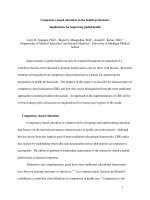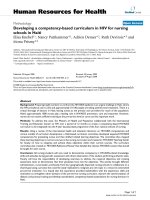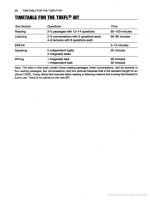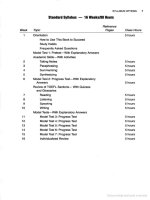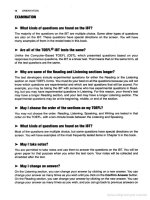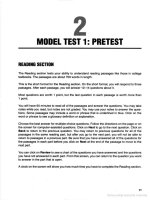Robin kessler competency based interviews (2006)
Bạn đang xem bản rút gọn của tài liệu. Xem và tải ngay bản đầy đủ của tài liệu tại đây (7.47 MB, 256 trang )
Master the Tough
New Interview Style
and Give Them the
Answers That Will
Win You the Job
Competency-Based
Interviews
By
Robin Kessler
Franklin Lakes, NJ
Copyright © 2006 by Robin Kessler
All rights reserved under the Pan-American and International
Copyright Conventions. This book may not be reproduced, in
whole or in part, in any form or by any means electronic or
mechanical, including photocopying, recording, or by any
information storage and retrieval system now known or hereafter
invented, without written permission from the publisher, The
Career Press.
COMPETENCY-BASED INTERVIEWS
EDITED BY JODI BRANDON
TYPESET BY ASTRID DERIDDER
Cover design by DesignConcept
Printed in the U.S.A. by Book-mart Press
Cartoons found on pages 72, 84, 98, 114, 144, 176,
198, and 212 by Steven Lait, 2006.
To order this title, please call toll-free 1-800-CAREER-1 (NJ and
Canada: 201-848-0310) to order using VISA or MasterCard, or
for further information on books from Career Press.
The Career Press, Inc., 3 Tice Road, PO Box 687,
Franklin Lakes, NJ 07417
www.careerpress.com
Library of Congress Cataloging-in-Publication Data
available upon request.
Dedication
This is for my mother, with love and thanks.
This page intentionally left blank
Acknowledgments
As always, a huge thank you to everyone who helped
with this book. I would, however, like to give a few people
some special recognition.
To Paula Hanson, thank you for doing the initial editing
and providing advice when I came up against problems.
Any kind of problems. And for hanging in as a good friend
for a very long time.
To Steven Lait, editorial cartoonist for the Oakland
Tribune and ANG Group, who drew the cartoons for this
book, thank you for doing great work for Competency-
Based Interviews, and being the best editorial cartoonist
on the planet and one of my favorite cousins.
To the consultants, Cara Capretta Raymond, Michael
Friedman, Dr. Kay Lillig Cotter, and Ken Abosch, thank
you for sharing your expertise, time, opinions, and personal
competencies. Having the opportunity to talk with each of
you has helped me make this book considerably stronger.
To David Heath, Dessie Nash, Blake Nolingberg, Mindy
Wertheimer, Erica Graham, Chip Smith, Kalen Phillips,
Stephen Sye, Diane Schad Dayhoff, Mary Alice Eureste,
and Bill Baumgardt, thank you for being subject matter
experts in your professional areas and answering all my
questions.
To Dr. Jon Wiener and Martha Williams, thank you for
sharing some of your favorite quotations with me.
To Ron Fry, Michael Pye, Kristen Parkes, Linda
Rienecker, Laurie Kelly-Pye, Jodi Brandon, Astrid deRidder,
and the rest of the staff at Career Press, thank you for
doing a great job of making my words look good, the book
look better, and being great to work with.
To my other friends and relatives, thank you for putting
up with my leaving early, not calling as often, and not being
as available to go out to dinner, the movies, or anything
else. Since this book is now finished, call me.
—Robin Kessler
Contents
Introduction 9
Chapter 1 Understand Competency-Based
Interview Systems 21
Chapter 2 Identify Key Competencies 33
Chapter 3 Know What Interviewers Are
Trained to Look For 49
Chapter 4 Expect Competency-Based
Behavioral Questions 61
Chapter 5 Prove Competencies
With Examples 73
Chapter 6 Look Like a Strong Candidate 85
Chapter 7 Consider Other Important
Interview Tips 99
Chapter 8 Check to Make Sure You Are
Ready for the Interview 115
Chapter 9 Look at Case Studies for Ideas
to Make Your Interviewing
Stronger 127
Chapter 10 Understand How a Typical
Competency-Based
Interview Flows 145
Chapter 11 Learn From Other Interviewees 155
Chapter 12 Send a Thank-You Note,
Follow Up, Get the Offer,
and Negotiate 177
Chapter 13 Actively Manage Your Career
in Competency-Based
Organizations 189
Chapter 14 Use Competency-Based
Resumes to Get Your Next
Interview 199
Chapter 15 Think Long-Term and Make
Change Work for You 213
Appendix A: List of Core Competencies 219
Appendix B: Competencies for Case Studies 237
Appendix C: Examples of Illegal
Pre-employment Questions 245
Notes 247
Bibliography 249
Index 251
About the Author 255
9
Introduction
What can you do today to be a star at interviewing and
improve your career? How can you get that specific offer
you want from the organization you want to work for? How
can you move forward in your career?
Think strategically.
What makes Lance Armstrong keep winning the Tour
de France? It takes more than luck to win a major sports
event seven times. He’s been so successful that, as of 2005,
he’s chosen to retire.
Why do publishers choose certain book proposals and
not others? Why do certain products do especially well and
others don’t?
How did Oprah become a star, and what does she do
to make sure she stays a star? How can she be so good at
interviewing others on her show, acting, and developing
and publishing her magazine? When Oprah decides to
promote a book through her book club or by having the
author on her show, book sales increase dramatically.
Why did you—or someone you know—get into a
prestigious college? Why do certain people get selected
for the best assignments and the best jobs? What causes
other qualified candidates to be rejected?
Competency-Based Interviews10
The answers to these questions are complex, but if we really
think about it, there are three basic steps we all need to take to
improve our ability to get what we want.
The faster we identify the changes and adjust our own approach,
the faster we will be successful. Realistically, we need to expect
these changes. New tools, new approaches, and new strategies
can cause decision-makers to make different decisions. If we adapt
to these changes earlier than others, we increase our probability of
winning.
That’s it. Lance and Oprah may have extra-strong athletic or
artistic abilities, and they are obviously smarter than average. But
both have also overcome major life challenges, namely cancer and
child abuse. Clearly, both celebrities figured out what it took to get
ahead in their fields, and they have mastered staying ahead of the
game as their competition became more savvy.
One of the key characteristics that will significantly help you
manage your own career as effectively as possible is learning how
to interview more effectively and convince the interviewer that you
are the best candidate for the job. Interviewing well is critical if you
want to be successful.
So how can we take the three steps that it takes to win and
apply them to interviewing? This book will show you how to be
more successful by:
What It Takes to Win
1. Learning what it takes to win is the first step.
2. Doing the things that it takes to win is the
second step.
3. Recognizing that what it takes to win changes—
sometimes rapidly—is the third step.
Introduction
11
l
Teaching you how to recognize the changes in interviewing
at the most sophisticated organizations.
l
Explaining what today’s interviewers are looking for.
l
Helping you adjust your own way of interviewing to
emphasize how your competencies match the employer’s
needs.
l
Developing a plan to ensure you perform well in every
critical interview.
When systems change and grow, we need to be smarter than
our competitors and recognize those changes as early as possible,
the way Lance and Oprah have always done. If we aren’t aware,
our own careers may be affected in a negative way. We need time
to develop and adjust our strategy, because employers do periodically
change the systems they use to select employees.
If we don’t change our own approach, we will eventually
become less valuable to our employer. We all need to take
responsibility for actively managing our careers, and that includes
changing our strategy to respond to the changes introduced by
employers. As we become even more astute, we may be able to
anticipate some of these changes and prepare for them.
This book will give you a new—and better—strategy you can
use to help you interview more effectively and improve your ability
to get the job you want in the best organizations. If you use this
approach, you will increase your chances of:
l
Being selected for the most competitive positions.
l Winning the best job at a new organization.
l
Getting a great first job or internship.
l
Being chosen for that critical promotion in your current
organization.
Competency-Based Interviews12
l
Taking control of your career path.
l
Increasing your salary.
l
Getting more satisfying assignments and more challenging
work.
What’s Different?
Understanding the way human resources managers, line
managers, and professionals approach selecting employees has
always given candidates an advantage in the interview process. If
you know what the interviewer is looking for—and you are savvy
enough to know how to use this information—you will have an
edge in the interview.
I’ve been told that at least half of the Fortune 500 and other
major organizations in the United States, in Europe, and
internationally are now using competency-based systems to help
select and manage their human resources.
1
Here are just a few
examples: American Express, Johnson & Johnson, Coca-Cola,
Toyota, Bank of America, BP, Wells Fargo, General Motors, HP,
Radio Shack, HCA, Carlson Companies, BHP, IBM, General
Electric, PDVSA, Anheuser-Busch, Girl Scouts USA, the U.S.
Federal Reserve System, and the province of British Columbia in
Canada.
Some of these organizations have worked with competency-
based systems for more than 15 years, and they are becoming
increasingly sophisticated with the applications they are using. Other
companies, government agencies, and nonprofit organizations have
adopted competencies more recently, or are looking at the possibility
of using them in the near future. Competency-based applications
help organizations manage their human resources—from selecting
employees to evaluating, training, paying, and promoting them.
Competency-based selection processes and competency-
based appraisals are the two most common ways companies are
Introduction
13
using competencies to help improve the caliber of their employees.
More and more companies are including a list of competencies
they need in their own Website ads and Internet advertisements on
Websites such as www.monster.com and www.careerbuilder.com.
Since January 2003, when I saw the need for the book Competency-
Based Resumes, the number of jobsite advertisements that
specifically list the competencies the employer is looking for
continues to significantly increase every time I check.
On November 23, 2005, Monster.com ran advertisements
asking for competencies from organizations of all sizes.
Companies with competency-based job advertisements
that day included:
l
Kaiser Permanente
l
Deloitte
l
Ernst & Young
l
Shell Oil
l
Marsh & McLennan
l
Ingersoll Rand
l
International Paper
l
St. Paul Travelers
l
Hitachi Consulting
l
MetLife
l
Heidrick & Struggles
l
Honeywell
l
Royal Caribbean Cruises
That same day, CareerBuilder.com ran an advertisement
for a Competency Modeling Manager for Wal-Mart.
Rockwell Automation advertised for an Engineering
Competency Leader, and Excellus BlueCross BlueShield in
Rochester, New York, was looking for a Manager, Project
Manager Competency Center. McGraw-Hill advertised for
a Director, Talent Management who would “conduct a
needs analysis to create an executive competency model
and ‘future’ leader profile.” Other organizations running
ads on CareerBuilder.com specifically mentioned
competencies on November 23, 2005, included:
l
Sears
l
Cingular Wireless
l
Administrative Office of the United States Courts
l
PriceWaterhouseCoopers
Competency-Based Interviews14
Employees at the best competency-based employers have the
ability to look up information about critical competencies on their
employer’s Website or in employee handbooks or manuals. The
competencies for their current positions are almost always covered
as part of their appraisal.
What Are Competencies?
Paul Green, in his book Building Robust Competencies (Jossey-
Bass, 1999), defines an individual competency as “a written
description of measurable work habits and personal skills used to
achieve a work objective.” Some organizations use a slightly
different definition for competencies: underlying characteristics,
behavior, knowledge, and skills required to differentiate performance.
They define what superior performers do more often, in more
situations, and with better results.
Put simply, competencies are the key characteristics that the
most successful performers have that help them be so successful.
Organizations benefit from working with competencies because it
gives them a better, more sophisticated way to manage, measure,
and improve the quality of their employees.
The use of competencies is continuing to grow. According to
Signe Spencer, a senior consultant with the Hay Group in Boston
and the coauthor of Competence at Work (John Wiley & Sons,
1993), “In the last ten years, we have seen an explosion of interest
in competency work at all levels worldwide.”
The relevant competencies that have been identified for all
positions organization-wide are called core competencies. But
competencies used in interviewing (and other applications) may be
identified at the department or functional level, or even at the
individual level. It takes different competencies to be successful as
an accountant than to be successful as a sales professional. In
Chapter 2, I will spend more time explaining competencies and
giving you the information you need to successfully identify the
relevant competencies for the position you want, before the interview.
Introduction
15
Many organizations choose not to use the term competencies.
They call the key characteristics that it takes to be successful
by other terms: success factors, attributes, values, dimensions, and
so on. There are subtle differences in what each of these terms
mean, and decision-makers have good reasons for choosing them.
For candidates, though, it simply makes sense to look at all of these
categories for information describing what the employer is really
looking for—those key characteristics or competencies.
Competencies are not just a trend, and the competency-based
systems designed by consultants and corporations can be complex.
This book will help you understand competency-based selection
systems and give you the tools you need, as a candidate, to navigate
your way through them.
What Are Competency-Based Interviews?
Today, more interviewers at the best employers are using
behavioral interviewing techniques to help determine how competent
candidates are in the key areas most critical for success. Behavioral
interviewing has been used for more than 20 years in most
sophisticated organizations, but many of these organizations have
only been using behavioral interview questions targeting relevant
competencies in the last five or 10 years. Other organizations began
working with competency-based interviewing even before that
timeframe.
Interviewers at many of the best organizations are being trained
to use competency-based systems and evaluate candidates in a
much more complex way than in the past. They are taught to:
l
Evaluate the candidate’s fit for the position based on their
perceived competency level.
l
Assess the candidate’s nonverbal and verbal communication
in a more sophisticated way.
Organizations may use different names, including targeted
selection interviewing and evidence-based interviewing, to describe
Competency-Based Interviews16
what is essentially competency-based interviewing. Some
competency-based interviewing is based on the approach of asking
primary questions targeting each key competency. Another
approach asks interviewers to identify evidence of competencies
by listening closely to the answers to questions, follow-up questions
(also called probes), and more follow-up questions. In Chapter 1,
we’ll be looking at these approaches in more detail.
Most career counselors and candidates haven’t changed their
approach to interviewing, resumes, and other job search techniques
to consider the competencies more of the best employers are now
looking for. Instead, they are marketing candidate strengths and
accomplishments the same way they always have. It is time to
accept that the job market has changed and become more
sophisticated. It simply makes sense to change your own approach.
Competencies are the way the majority of the most respected
organizations measure whether to interview and hire candidates.
For candidates or employees trying to turn their interview into a job
offer, it’s time to change and be more strategic. It’s time to understand
how to use your own competencies to convince employers you are
the best candidate for them—because you can prove to them you
have the critical competencies they need.
It’s up to you to learn how to interview the current, competency-
based way. To do this, you need to:
1. Understand competency-based interview systems.
2. Identify the key competencies for the position.
As the saying goes, you don’t want to be
fighting today’s war using equipment, strategy,
and tactics from the last century.
Introduction
17
3. Know what interviewers are trained to look for.
4. Expect competency-based behavioral questions.
5. Prove your competencies with examples.
6. Look like a strong candidate.
7. Consider other important interview tips.
8. Check to make sure you are ready for the interview.
9. Look at case studies for ideas to make your interviewing
stronger.
10. Understand how a typical competency-based interview
flows.
11. Learn from other interviewees.
12. Send a thank-you note, follow up, get the offer, and negotiate.
Once you have started your new position, you may also need to
learn to conduct competency-based interviews. And you will be
more successful in your new position if you take the time to follow
the suggestions we give in Chapter 13 on managing your career in
a competency-based organization and in the final chapter on how
to think long-term and make change work for you.
By following the suggestions in the book, you will perform better
in any interview and increase the probability of an offer. Learning
to master the competency-based interview will give you skills that
will help you interact better with other professionals in meetings,
one-on-one interactions, and other types of interviews.
Organizations also benefit from their candidates learning how
to be interviewed more effectively. If more people give good,
thoughtful answers that illustrate their experience with competencies,
managers will have better, more complete information to use when
they make their decision about which candidate is the most competent
for the job.
Many strong, highly competent candidates may benefit from
interview coaching or training to help them think about their best
accomplishments in each competency area before the interview.
Competency-Based Interviews18
Most managers know that the best employees aren’t always the
best interviewees.
Are you ready to start sharpening your interviewing skills so
the interviewer will realize you are the most competent candidate?
Let’s start now.
At the end of every chapter, a question and answer summary is
included for your review. These summaries will give you the
opportunity to reread the most important points and ensure you
understand them. Take the time you need to grasp the concepts
and ideas before moving on to the next chapter.
Key Points for the Introduction
“An individual competency is a written description of
measurable work habits and personal skills used to
achieve a work objective.”
–Paul Green
Key Questions
What does it take to win in
today’s organizations?
1. Learning what it takes to win.
2. Doing the things that it takes
to win.
3. Recognizing that what it takes
to win changes—sometimes
rapidly.
Answers
What are competencies?
What are core competencies?
The key characteristics that the most
successful employees have that help
them be so successful.
Core competencies are skills used
organization-wide to help achieve
organization objectives or goals.
Introduction
19
What are behavioral interview
questions?
Behavioral interviewing is based on
the theory that past behavior is the
best predictor of future behavior. In
other words, past success predicts
future success.
In addition to the core
competencies, what are the
other levels of competencies?
What are the two most
common competency-based
applications?
l
Competency-based appraisals
l
Competency-based screening and
interviewing to select candidates.
Key Questions
Answers
How can you increase your
ability to get the position you
want?
Competency-based organizations
rely on a different system for look-
ing at what it takes to be success-
ful in jobs, particularly when
selecting, promoting, and training
their employees. Understanding
how competency-based systems
work is vital to success in today’s
organizations.
Surprise! The most important thing
to remember is that these systems
always change. You need to adjust
your own approach to match the
employer’s changes.
l
Department or functional
l
Individual
Competency-Based Interviews20
How can you keep promoting
your competencies?
How are companies using com-
petencies to strengthen their
workforce?
It is important to keep marketing
your competencies even after
getting the position. Other strategic
marketing tools are: competency-
based resumes, cover letters,
networking, and interview skills.
Remember to focus on the
competencies required by your
prospective employer—or your
current employer, if you want to
be considered for promotion or
other opportunities.
They are using competencies to:
l
Advertise for candidates
l
Screen candidate resumes
l
Interview using behavioral
techniques
l
Select employees
l
Evaluate employees
l
Train employees
l
Promote employees
l
Reward employees
l
Determine assignments
Key Questions
Answers
What can you do to excel in
interviews for very competi-
tive positions?
To master the tough interview style,
your answers to interview questions
must be focused (focused on the
competencies desired), powerful
(use powerful words to describe
your competency), and concise
(make a point, make it clear, and use
precise wording).
21
Chapter 1
Understand
Competency-Based
Interview Systems
When we were students, most of us realized the
importance of understanding what the teacher or professor
was looking for—which assignments were required and
which were optional. And if we are playing sports, we need
to understand the strengths, vulnerabilities, and game plan of
our opponent, even if we are the #1 seed in the tournament.
When we give a business presentation, we need to identify
our goals and understand the needs and interests of the
audience before we start developing the speech.
Figuring out what other people are looking for is critical
to being successful in most things throughout life. Assuming
we have the basics, we simply have to provide the evidence
and, in an interview, convince them that we fit.
Before we start preparing for an interview, it is important
to understand the method of interviewing that will be used
by the interviewer. Some organizations are still traditional in
their approaches to interviewing. Many managers still ask
questions that help them make decisions about candidates
based simply on whether or not they like them. In addition,
they may focus on whether the candidate meets their basic
requirement on credentials, such as grades and class
standing. Most law firms and many of the more traditional
companies are still interviewing candidates this way.
Competency-Based Interviews22
Some managers use hypothetical questions based on giving the
candidate a scenario and asking what he or she would do. People
who like this interview style believe it gives them a chance to see
how candidates think on their feet, but many others believe that it is
not as effective as finding out how individuals have performed in
the past.
Most of the managers at organizations with strong, positive
reputations have realized that the old-style interviews don’t seem
to be that effective in helping them choose employees. They’ve
changed to the competency-based interview style.
What’s Changed?
Recognizing how the labor market has changed—and learning
how to make those changes work for you—can make the difference
between success and failure.
The most sophisticated employers are primarily using
competency-based interview systems to select candidates. If you
haven’t interviewed recently or if you come from a different culture,
you probably know you need some help to do well in the interview.
Some candidates think they know what to expect in the interview,
and it may take a few bad experiences before they decide their old
approach is not working as well as it used to.
But even if you are articulate, think well on your feet, have the
best credentials, and are confident you are a great candidate,
preparing for the interview is important. Remember that how well
you perform on the interview gives the interviewers an idea of the
quality of work they can expect from you in the future.
Whether you are writing a resume, preparing for an interview,
or getting ready for a performance evaluation, becoming more aware
of what competencies the employer is looking for is the first step to
help make you more successful. The next step? Learn what you
need to know to prove to the employer that you are strong in these
critical competency areas.
Understand Competency-Based Interview Systems
23
How Does a Competency-Based Interview Work?
Very simply, a competency-based interview uses behavioral
questions to help the interviewer assess the candidate based on
critical competencies that have been identified by the employer.
The interview is highly structured, with key questions provided for
the interviewers to help them determine how strong candidates are
in specific competency areas.
Key Definition
Competency-based interviews are structured and use
behavioral questions to help the interviewer assess
candidates based on critical competencies identified for
the position.
Whether you are a candidate who wants to work for an
organization using competency-based systems or an employee
currently working in a competency-based company, it is important
to recognize that it may be time to change your own approach to
the process. Retool and retrain. Adjust the sails. Add a warm-up
period before running. Accept the fact: In today’s most sophisticated
organizations, almost all are using competency-based interviews.
The most commonly used competency-based interviewing style
is based upon asking candidates primary questions targeted to the
critical competencies for the position. Almost every major consulting
firm working to help organizations identify competencies, including
Lominger, Personnel Decisions, Inc., Hay Group, and Hewitt
Associates, encourages its clients to use structured, competency-
based interviewing processes that they have developed.
One well-known example of this approach is Targeted Selection
Interviewing, which was developed by the consulting firm
Development Dimensions Inc. On its Website, the firm markets
Targeted Selection by saying it uses behavioral interviewing and
helps organizations:
Competency-Based Interviews24
l
Identify the competencies needed for all key positions.
l
Build interviewing skills and confidence for more accurate
selection decisions.
l
Increase the efficiency and effectiveness of the employee
selection process.
Another interviewing approach related to competency-based
interviews starts with the manager asking a question about a major
accomplishment and then asking follow-up questions to probe for
additional information about competencies, strengths, and
weaknesses. An example of this approach is Lou Adler’s The One
Question Interview.
Both styles are covered in more detail later in this chapter.
Although the style may be a little different, managers are taught
to ask candidates behavioral questions, based on the theory that
past behavior is the best predictor of future behavior. In other words,
past success is the best predictor of future success. The managers
are then asked to assess how competent the candidate is in several
critical areas.
Key Definition
Behavioral questions are based on the theory that
past behavior is the best predictor of future behavior.
To gain the understanding we really need to perform well in a
competency-based interview, we need to first understand the
answers to this question: What are the two basic interview styles
that consider competencies?



